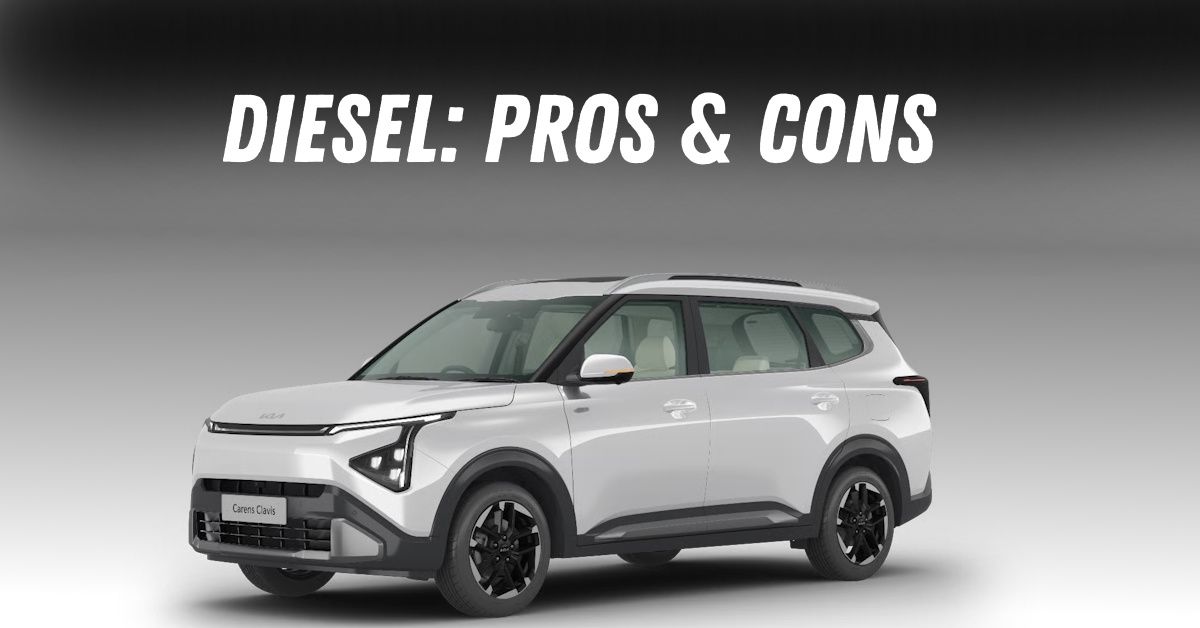Kia Carens Clavis Diesel Variant: What You Gain vs What You Lose


The Kia Carens Clavis diesel presents a thoughtful proposition for Indian families in search of a practical, fuel-efficient MPV. On paper, the numbers are convincing. But a deeper look reveals a classic automotive trade-off: strong economics balanced against a trimmed-down features list. Understanding this give-and-take is crucial for anyone considering the diesel variant as their everyday companion.
There’s no denying the appeal of the diesel engine’s fuel economy. The manual variant is rated at 19.54 kmpl, while the automatic version delivers 17.5 kmpl. These figures put it among the most efficient seven-seaters in the market. For families clocking high monthly mileages, these savings can quickly add up.
Take a scenario where a family covers 1,500 km a month. At current diesel prices, that works out to just under ₹8,000 in fuel costs, a clear advantage over petrol options. Add to this the fact that diesel generally costs less per litre, and the long-term benefit becomes more pronounced.
The transmission choice also adds to the diesel’s value case. Unlike the turbo-petrol version, which uses a dual-clutch automatic that can be temperamental in urban traffic, the diesel is paired with a six-speed torque converter. This traditional setup is known for its durability and smoother behaviour in city conditions.
Then there’s the driving range. With a 45-litre tank, the diesel manual variant can, in theory, cross 875 km on a full tank. For long-distance travellers or those with lengthy commutes, that’s fewer fuel stops and less hassle.
Yet, these advantages come at a cost and not just at the time of purchase. Buyers opting for the diesel variant will need to compromise on several creature comforts and tech features that define the higher trims of the Clavis lineup.
To begin with, the diesel automatic is available only in the HTK Plus variant. There’s no option for those wanting either the fully loaded version or a stripped-down entry trim. This narrows the appeal for both budget buyers and those looking for all the bells and whistles.
Key features are also absent. The panoramic sunroof, which adds a sense of airiness to the cabin, is replaced by a basic single-pane unit. Ventilated front seats are missing too — a letdown in hot and humid climates. The driver’s seat remains manually adjustable, forgoing the convenience of electronic controls and memory settings.
Perhaps the biggest omission is in the area of safety and driver aids. The diesel variants do not offer the Level 2 ADAS suite found in the turbo-petrol trims. That means no adaptive cruise control, lane assist, or forward collision warning — features increasingly seen as essential in modern family vehicles.
Other convenience touches are gone too. Features like customisable driving modes and ‘Boss Mode’ (which allows rear passengers to adjust the front seat) are absent in the diesel line-up. These small but meaningful extras can affect day-to-day comfort, especially for chauffeur-driven families.
The 1.5-litre diesel produces 116 PS and 250 Nm of torque. It’s a respectable figure, but not one that excites. Acceleration is sufficient for daily use, but overtaking on highways, especially with a full load, requires planning. The engine doesn’t feel particularly quick off the mark either, and a hint of turbo lag remains at low revs.
Refinement is another area where the diesel shows its age. While not unpleasant, the engine does get vocal under hard acceleration. Vibrations are better controlled than older diesels, but still noticeable, especially to those used to smoother petrol or hybrid powertrains.
The Clavis diesel is clearly aimed at high-mileage users who prioritise running costs above all else. It’s a solid, no-nonsense offering that delivers where it matters most: fuel economy, torque delivery, and transmission reliability. For families doing long commutes or frequent highway trips, these qualities can significantly reduce the cost of ownership over time.
But for buyers drawn to the Carens Clavis for its tech-laden cabin and modern comforts, the diesel variants might feel a step behind. The absence of key features, especially in the realm of safety and convenience, could be a deal-breaker for some.
In the end, the Carens Clavis diesel isn’t for everyone but for those willing to prioritise economy over indulgence, it quietly makes a very strong case for itself.